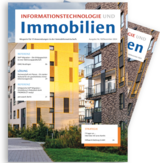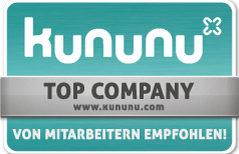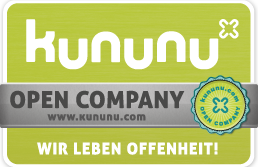Digitisation in the real estate sector – Mobility is the trump card
Mr Kramer, what will the homes of the future be like?
Kramer: I recently heard a good quote from the head of design at a prestigious automotive manufacturer. He said that he is trying to translate the buyer’s demands for a sustainable car into his designs. I found this statement very interesting and I think it can also be applied to real estate.
Efficiency and sustainability are aspects that reflect personality and zeitgeist. The homes of the future will be digitised, not only in terms of the properties themselves and their uses, but also with regard to management and value preservation. Whereas in the past, for example, I simply went out and bought paint, I can now obtain comprehensive systems from the ladder and paintbrush right through to a fashionable, harmonised colour scheme. Digitisation is not an end in itself, and is not a temporary fashion, but rather puts the emphasis on the benefits. First and foremost, this is good for the customers.
Digitisation ensures efficiency. And efficiency ensures sustainability. Hardware and software will merge into one. It will not be possible to separate the digitisation of the management processes from the digitisation of the property itself.
There are already many clever solutions today. They are being put together one after the other and, in my view, the combined result is what we are set to see in the future. We will still be working on this for several years.
Smart buildings – What does the term “smart building” mean for you in the context of sustainability and digitisation?
Kramer: True to the motto “anything goes”, there are at first glance a huge number of solutions on offer, from the intelligent letterbox to lighting with voice recognition. All this is possible, and all these innovations are likely to be used, but we should ask ourselves how to do the right thing in the right way. What I would clearly recommend here is to start with your own processes. We always need to start somewhere, and we can only take one step at a time. This sounds so mundane, but I have the impression that many people despair at the sheer volume. Do we need to be brave to digitise things? I think good common sense is enough.
I can, of course, print an operating cost statement on recycled paper and deliver it using an electric vehicle today. But in the future, such statements will be delivered by app, with no need for paper and no need for physical delivery. And homes will have smart sensors, from which the measured figures for heating and water consumption can be queried and processed electronically at any time. Efficiency is sustainable and the future belongs to sustainability.
Let’s stick to the example of the operating cost statement. Many property management companies have over the last few decades taken to sharing their work with service providers and no longer have the expertise to read the measuring devices installed in their properties themselves or to settle the costs with their tenants in an integrated invoicing process. Most of them have simply loaned the sensors and purchased an invoicing service. That isn’t exactly smart. A smart building would remove these established dependencies.
If I want to buy a train ticket, I no longer need to queue at the ticket office. I have an app with which I can do it myself. That is what I call smart.

What kind of impact will the new technologies – big data, artificial intelligence, machine learning – have on the real estate sector?
Kramer: The real estate sector is a service sector. We have a wealth of tenants, countless potential tenants, numerous owners and many service providers. The volume of communication is huge. And in this networked communication I see substantial potential for new technologies.
I find language assistants fascinating. Unfortunately, these systems are currently very isolated. There is Amazon’s “Alexa” and Apple’s “Siri”, for example, each of which is limited to its own world and extremely manufacturer-specific. Although a breakthrough is predicted, the current figures are rather disillusioning. For me, however, this is the most fascinating application case for AI. A function to dictate text onto an electronic form is already a reality for many of our customers and actually facilitates their work. In my opinion, automatic translation functions are also becoming increasingly important.
I have heard of solutions that are able to perform keyword indexing on scanned documents themselves and direct them to the right workflow fully automatically. I see this as an interim solution, as there won’t be anything to scan anymore in a completely digitised world.
Nevertheless, I am convinced that there will be many application cases for intelligent image recognition and processing in the real estate sector. For example, we have experimented with a solution in which a service technician takes a photo of a damaged item such as a burnt electrical socket. The Google image search function then recognises that the picture shows a socket and completes the damage form in the app almost completely by itself. I am also overwhelmed by the technologies already available today for the virtual inspection of properties. We have already incorporated videos of drone flights and simple virtual viewing functions into our easysquare rental solution. I am convinced that such solutions have many benefits and I believe them to have great potential for the future. After all, all housing companies strive to achieve full occupancy as soon as construction is complete.
To sum up, we can say that developments that help to achieve significantly improved processes will come about. But it is more a case of evolution rather than revolution.
What trends can you make out in the context of digitisation and property management?
Kramer: Building digitisation is a clear trend topic. We will be breaking new ground here with regard to interconnecting sensors and software. In addition to the building physics, we now also have measurement and automation elements that can no longer be separated from the corresponding software solutions. Advanced technology is becoming customary. This is giving rise to sizeable value chains for property managers. On the other hand, the IT landscape in companies needs to be expanded. This may sound rather trivial, but it is actually a fundamental building block. Everything that is currently still processed on paper or in extensive Excel spreadsheets can now be consistently digitised. This concerns not only the internal workflows of a company’s own administrative employees, but also all interfaces with service providers and customers, as well as with the sensors in the digitised buildings.
Easysquare is a digitisation platform that essentially helps to completely integrate these workflows digitally and to connect employees with service providers, customers and sensors.
To what extent do your company and its solutions support property owners in securing the value of their properties?
Kramer: The reporting service in the easysquare owner app provides property owners and investors – who outsource the management of their real estate inventory – with the key performance indicators and evaluations of their portfolio. All the important KPIs and information on the portfolio can be accessed at any time, including master data for the properties, rental income and receivables, vacancy rates, and the development of fluctuation and maintenance expenses. Further functions round off this absolute added value: news or reports, such as the annual report, can be provided or viewed.
Moreover, it goes without saying that the quality of property management has a direct influence on protecting the value of the property. And a comprehensive digitisation platform such as easysquare provides considerable support for quality-oriented property managers.
In a nutshell, our mobile solutions are the best investment in your property.
Thank you for the interview.
Text first published in TREND REPORT – editorial office and newspaper for modern business | issue dated 11/2019.


